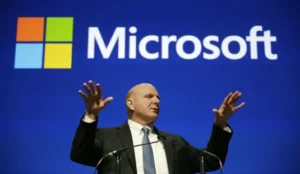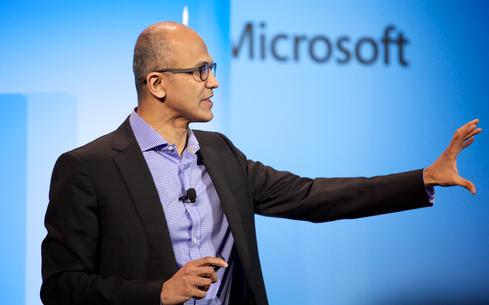Overview of Microsoft’s Acquisition of Dealogic
The recent acquisition of Dealogic by Microsoft, valued at $170 billion, marks a significant event in the technology and financial services sectors. This investment is aimed at enhancing Microsoft’s offerings and provides a strategic advantage in the competitive market landscape. Dealogic, a prominent player in financial analytics and technology, aligns seamlessly with Microsoft’s intent to expand its cloud services and data analysis capabilities. By integrating Dealogic’s expertise, Microsoft can Microsoft 170B Nadella Dealogic strengthen its position in key markets, including financial services and capital markets.
One of the primary motivations behind this acquisition is to bolster Microsoft’s Azure cloud platform. As financial institutions increasingly migrate to cloud-based solutions, Microsoft aims to leverage Dealogic’s tools and data to deliver enhanced analytics and insights. This move not only positions Microsoft as a leader in cloud computing but also provides significant value to clients looking for sophisticated and integrated financial solutions.
Furthermore, the acquisition is expected to lead to substantial efficiencies and innovations within Microsoft’s portfolio. By utilizing Dealogic’s Microsoft 170B Nadella Dealogic advanced analytical capabilities, Microsoft can offer a comprehensive suite of services that ultimately benefits its stakeholders, including customers, investors, and partners. Historical trends suggest that technology companies investing in data analytics experience significant gains in responsiveness and agility within their operations, which can lead to improved market performance.
In the larger context of technology investments, the Microsoft 170B Nadella Dealogic acquisition highlights an increasing trend of large corporations seeking to acquire specialized firms for competitive advantage. This deal not only illustrates Microsoft’s growth strategy but also its commitment to adapting to ongoing changes in the financial landscape. As businesses continually evolve and seek new technological solutions, Microsoft’s foresight in acquiring Dealogic could set a new benchmark for future deals in the tech industry.
The Role of Satya Nadella in the Deal
Satya Nadella’s leadership at Microsoft has been pivotal in the company’s ambitious strategic maneuvers, including the landmark $170 billion acquisition of Dealogic. Since taking the helm in 2014, Nadella has redefined Microsoft’s vision, focusing on innovation and cloud technologies that have transformed the company into a global leader. His commitment to a growth-centric approach has been evident in his orchestration of major deals, including the recent Microsoft 170B Nadella Dealogic acquisition. This decision underscores his forward-thinking mindset aimed at solidifying Microsoft’s position in the financial technology sector.
Nadella’s leadership style is characterized by collaboration and open communication, which fosters a culture of innovation within the organization. His ability to encourage cross-departmental teamwork has been critical in navigating the Microsoft 170B Nadella Dealogic complexities of the evolving tech landscape. The integration of Dealogic’s data and analytics capabilities into Microsoft’s ecosystem is a testament to his strategic thinking, which has consistently prioritized aligning acquisitions with the broader corporate vision. By ensuring that each acquisition is symbiotic with Microsoft’s existing strengths, Nadella has effectively steered the company towards new growth avenues.
Industry experts have lauded Nadella for his remarkable capacity to identify opportunities that align with emergent technology trends. This acumen has been essential in shaping the narrative of Microsoft’s evolution. The Microsoft 170B Nadella Dealogic deal not only reflects his dedication to enhancing the firm’s technological footprint but also highlights his resolve in positioning Microsoft as an innovator in financial solutions. As analysts look to the future, it is clear that Nadella’s strategic foresight and leadership will continue to influence Microsoft’s path, making this acquisition a critical chapter in the company’s ongoing story.

Impact on the Financial Services Sector
The Microsoft 170B Nadella Dealogic acquisition stands poised to significantly influence the financial services sector. As Microsoft integrates Dealogic’s comprehensive suite of tools into its existing portfolio, financial institutions can expect enhanced operational efficiencies and improved service delivery. The incorporation of Dealogic’s innovative solutions—ranging from deal management to workflow automation—will not only broaden Microsoft’s offerings for banks and investment firms but also facilitate a more data-driven approach in their operations.
This strategic acquisition positions Microsoft favorably against other technology giants striving for dominance in the financial services landscape. By marrying Dealogic’s sophisticated technology with Microsoft’s robust cloud infrastructure, institutions will be able to leverage sophisticated analytics and real-time data insights to make informed decisions. This fusion enhances Microsoft’s competitive edge, making it an attractive partner for financial institutions seeking to modernize their systems and workflows.
The potential shifts in market dynamics engendered by the Microsoft Nadella Dealogic acquisition could lead to an increase in collaboration between technology providers and financial institutions. As technology evolves, institutions will likely prioritize partnerships that offer integrated solutions capable of enhancing customer experience and operational performance in an increasingly competitive market. Furthermore, the integration of Dealogic’s technology could lead to the emergence of new service delivery models, wherein traditional banking services are supplemented by innovative approaches to customer engagement and transaction management.
Ultimately, the Microsoft 170B Nadella Dealogic acquisition is likely to act as a catalyst for transformation within the financial services sector. With enhanced capabilities and a stronger technological framework, Microsoft may well reshape the future of financial service delivery, establishing new standards and fostering a more integrated financial ecosystem.
Future Outlook and Implications for Microsoft
The Microsoft 170B Nadella Dealogic acquisition marks a pivotal moment in the company’s trajectory, promising to influence its long-term strategies significantly. As technology continues to evolve, Microsoft is poised to leverage this investment to drive innovation in various sectors, from cloud computing to artificial intelligence. The integration of Dealogic’s robust platform into Microsoft’s existing ecosystem stands to enhance data analytics capabilities, enabling users to gain deeper insights into financial markets and investment strategies.
This acquisition aligns seamlessly with Microsoft’s overarching business goals, which emphasize a commitment to delivering value through advanced technological solutions. By incorporating Dealogic’s tools, Microsoft not only secures a competitive edge in the financial services sector but also expands its reach into analytics-driven markets. This alignment reflects a strategic foresight, where enhancing their software offerings can facilitate growth across diverse industries, fostering a more connected and efficient operational framework for clients worldwide.
However, such a substantial investment is not without challenges. The integration of new technologies and platforms often entails risks related to compatibility, user adoption, and operational disruptions. There may also be concerns over maintaining the existing customer base while integrating Dealogic’s offerings seamlessly. Experts have noted that the success of the Microsoft 170B Nadella Dealogic deal will hinge on the company’s ability to manage these potential pitfalls effectively.
Microsoft 170B Nadella Dealogic In the coming years, the potential for innovation stemming from this acquisition appears promising, yet contingent on strategic execution. Industry analysts exhibit cautious optimism, suggesting that if Microsoft can harness its resources efficiently, this deal could very well redefine its positioning within the tech investment landscape. Overall, the future ramifications of this acquisition have the potential to unlock significant avenues for growth and innovation, strengthening Microsoft’s commitment to being at the forefront of technological advancement.
May Be You Also Read
